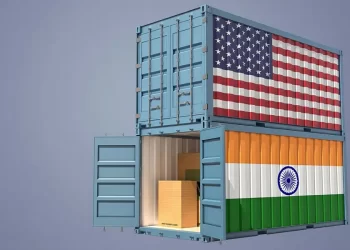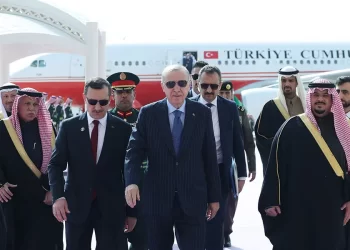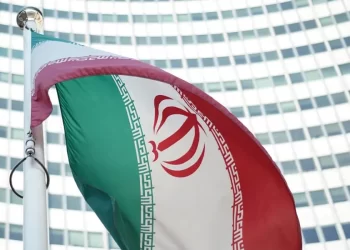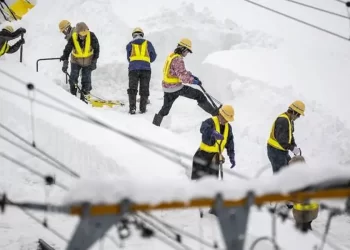ROME (news agencies) — It was still dark and quiet outside when Ousmane Sylla performed his last prayer in the courtyard of an Italian migrant jail.
“I miss my Africa very much and my mother too,” read a scribble in French on the wall nearby. ”May I rest in peace.”
A few moments later, the silence of dawn was shattered. Chaos took over the detention and deportation center of Ponte Galeria on the outskirts of Rome as other inmates discovered the body of the 21-year-old Sylla, who had apparently hanged himself.
Sylla had landed on Italian shores the year before, one of tens of thousands of people who pay migrant smugglers hundreds or thousands of euros to cross the Mediterranean to reach Europe. He had no visa, and had been ordered to leave after admitting that he had lied about being a minor.
Fellow detainees who discovered his body screamed for help and frantically tried to resuscitate him. When paramedics finally arrived, Sylla was gone. Enraged by his death, migrants set mattresses on fire, broke down doors and threw stones at security forces inside the jail. The riots led to the arrest of 13 people.
Sylla’s death in February shined a spotlight on the conditions inside these de-facto jails for migrants, which have been condemned by lawyers and refugee activists as “black holes” of human rights violations. And yet the far-right-led government, led by Premier Giorgia Meloni, vowed to build more such facilities across the country as well as abroad.
“I want to send a clear message to those who want to enter Italy illegally … it is better you don’t do it and you don’t put your life in the hands of smugglers,” Meloni said in a video posted on social media last year addressing would-be migrants. “And in any case, if you enter Italy illegally you will be detained and repatriated”.
The Italian government says the centers, which were established in 1999, are essential to deterring migrants like Sylla from risking their lives to cross the Mediterranean and reach Europe.
The centers are meant to detain those migrants who enter the Italian territory without a visa, are not entitled to apply for asylum and are labeled as “socially dangerous” by law enforcement authorities. Earlier this year the Italian government extended the time foreigners can be detained, from 90 days to 18 months.
Sylla’s chances of being deported were minimal because Guinea has no repatriation agreement with Italy. He wanted to return to Guinea, he told officials, yet a judge extended his detention.
He had dreamed of a better life in Europe. Now he just wanted to go home.
Sylla’s journey from the West African nation of Guinea to Italy began in 2022. One of 7 children, he dropped out of school during the COVID-19 pandemic after his family could no longer afford the fees. He learned masonry but his real passion was singing. Sylla posted videos of himself on TikTok rhyming and gesturing his hands like a rapper.
“His dream was to become a big star, that everyone would say his name, and he would sing for everyone,” his older sister, Mariama Sylla, said from the family’s modest house in the outskirts of the capital, Conakry.
He had never shown any signs that he was mentally unwell, his family said.
“He was strong. He was brave. He loved our entire family. He can’t do it, he can’t do it. He can’t leave us like that,” Mariama repeated in despair.
To get to Europe, Sylla crossed the Sahara through Mali, Algeria and Tunisia, always calling his mother and sister to keep them updated on his journey. They sometimes wired him a little money when they could, and Sylla worked small jobs to pay smugglers along the way. He made his way to the Tunisian coast, where smugglers move thousands of migrants from northern Africa to Europe on rickety boats. This Central Mediterranean route is known as one the deadliest migration crossings in the world; more than 2,500 people died or went missing last year alone.
After nearly drowning in the Mediterranean, Sylla finally reached the Italian island of Lampedusa on July 29, 2023. Again, he called his family to tell them he had made it.
But his odyssey through the Italian migration and asylum system was only beginning.
Sylla was trying to join his older brother, who lives in France. But when he reached the border town of Ventimiglia on August 9, 2023, he was rejected by French authorities. After lying about his age in the hopes it would increase his chance of getting residency, Sylla was sent south, to a center for underage migrants in the town of Cassino.
But the place that was supposed to look after unaccompanied minors was violent and dysfunctional, his brother and witnesses told news agencies. During his time in Cassino, Sylla told them he was repeatedly beaten up by other migrants and felt unsafe. He sometimes left the center and sought shelter with neighbors who told news agencies that police were frequently called in to resolve scuffles.









